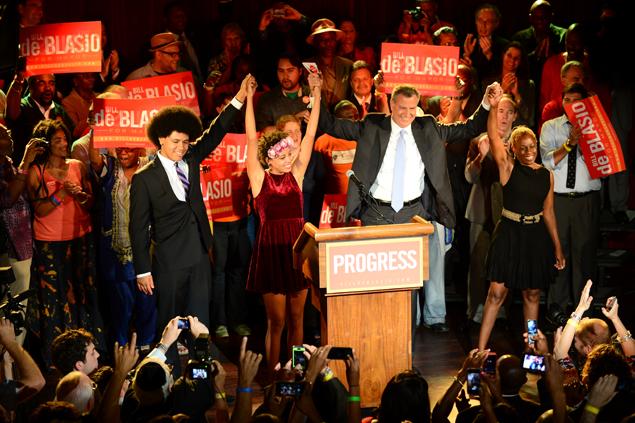On November 5, 2013 Bill de Blasio was elected as the Mayor of New York City; a historic victory in scope and significance. De Blasio will become the first Democratic mayoral candidate to win the election in two decades, beating Joe Lhota in a landslide victory with 73% of the vote. This gives the Mayor-Elect a mandate of the people. De Blasio’s victory over the conservative Joe Lhota is an example of the liberal direction that New York, and maybe the country, is taking. With the rising economic crisis affecting everyone in the city, De Blasio promised that his stay in office would be the complete opposite of the Bloomberg era. Throughout his campaign he continually portrayed himself as the anti-Bloomberg. Taking full advantage of the diversity of his family, de Blasio was able to gather the support of the city, which itself is very diverse. De Blasio was further able to garner more support from minorities with his stance on the usage of stop- and-frisk tactics, in neighborhoods that exhibit high levels of crime, which are mainly Black and Latino neighborhoods.
In an interview with the New York Times, De Blasio laid out his plans for the city’s future under his care. He spoke out adamantly on the issues that New Yorkers are most worried about such as the economy and the school system. The education system and economic status of the city were the core components of de Blasio’s campaign. He even made it a point to show the city that he, himself, is invested in the public education system. He constantly made it a point to point out that his children are “public school” kids.
De Blasio, who grew up in Brooklyn, portrayed himself to be like any other average Joe walking around New York City. He did so by reaching out to the many New Yorkers, that he felt were left behind by the business “Manhattan centric” Bloomberg administration. This resonated with the people who were disillusioned by the Bloomberg administration. His campaign revolved around a pledge to increase taxes on the wealthy / elite of New Yorker, who earn more than $500,000. De Blasio claimed the tax increase on the wealthy would pay for a universal pre-kindergarten. He has stated that the most important solution to the socioeconomic inequality would be to provide universal prekindergarten to every child and also to provide after-school programs to middle-school students. He has also pledged to improve the economic opportunities of the neighborhoods that are predominantly minorities and middle-class.
On the topic of grading schools, de Blasio will dismantle one of the Bloomberg administration’s core principals, which is the A-through-F grading system for schools. He has stated that he would instruct the schools to focus on curriculum, quality neighborhood schools, arts and physical education, and not focus too much on the test scores. This has made him a champion of the teachers union along with his many other education friendly organizations.
When asked about his plans for lowering the city’s unemployment, and increasing the chance of New Yorker’s obtaining a full time job, de Blasio stated that he would relocate a resource that has been set aside for tax breaks to companies and shift them into improving the City University of New York system, also to provide loans to the many small businesses within the city. His willingness to end the tax breaks for big business proves just how different his stay in office will be compared to Bloomberg’s tenure in office. He also has called for eliminating some corporate tax breaks, including a property tax abatement for companies constructing or renovating commercial buildings. He was the polar opposite to his opponent Lhota, who believed that taxes should not be raised on companies.
De Blasio also stated he would expand the network of high schools that focuses on providing trade skills for students. In order to alleviate the income inequality, he promised that he would fight for laws that would raise wages and provide benefits to low-wage workers. De Blasio is a strong proponent of paid sick days, paid family leave, a local minimum wage, and a “real living wage” law.
On the issue of the rising cost for health insurance premiums for city workers, De Blasio stated that he would create up to 20 health clinics reserved for municipal workers. These clinics would be able to offer the workers and their families’ routine checkups, basic lab tests, prescriptions, vaccines and chronic disease management. While de Blasio tried to distance him from many of Bloomberg’s decisions, there is one that he agrees with, and it is the ban on large sugary drinks. He believes that Mayor Bloomberg was correct in taking steps to ban large sugary drinks.
Bill de Blasio promises to bring a wide variety of change to the city. We can’t take his words alone. We must judge his time in office. We will just have to wait and see how much of a difference, he truly is for New York City. Based on Obama’s promises in the past two elections, I am not holding my breath.

